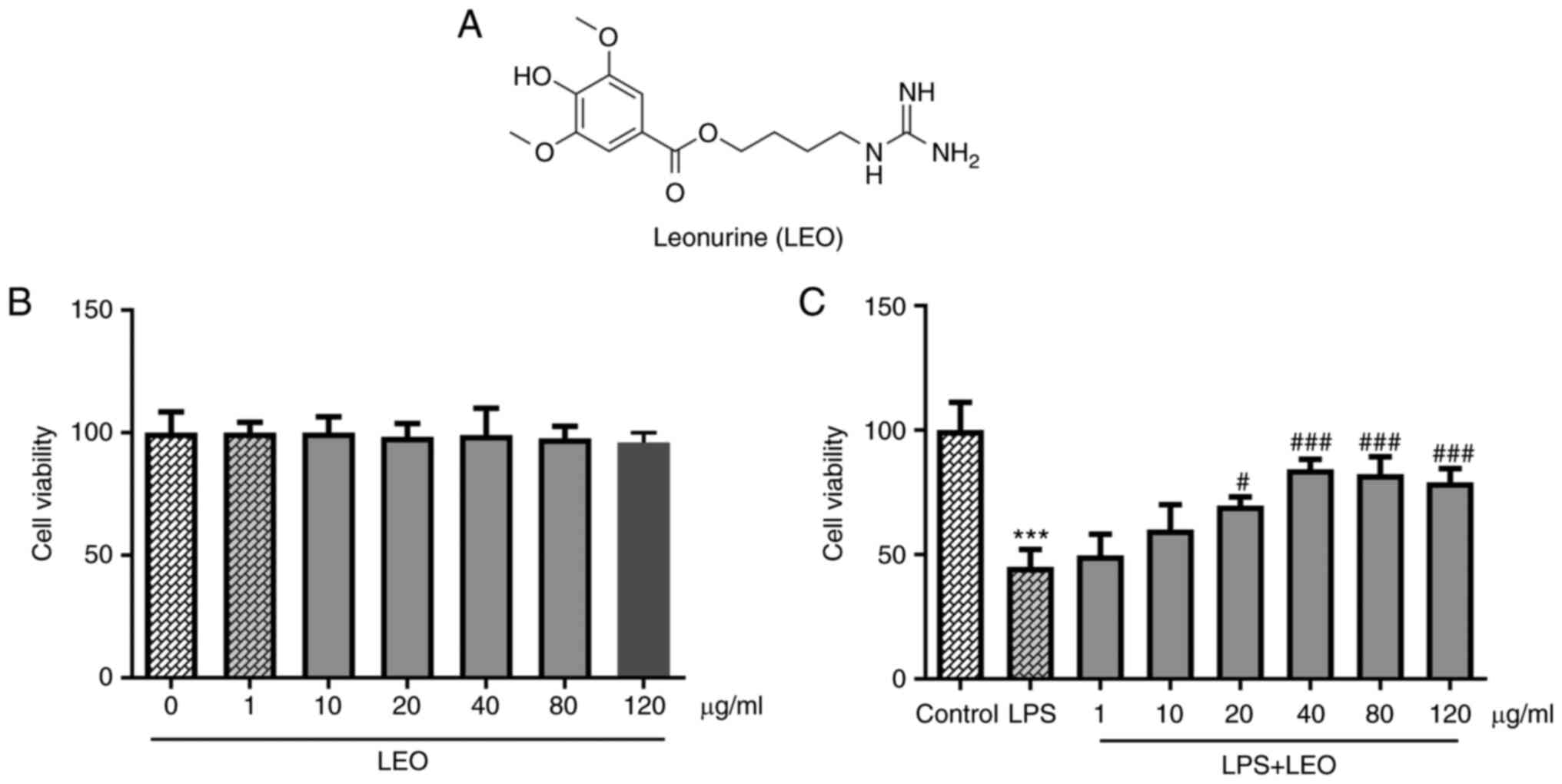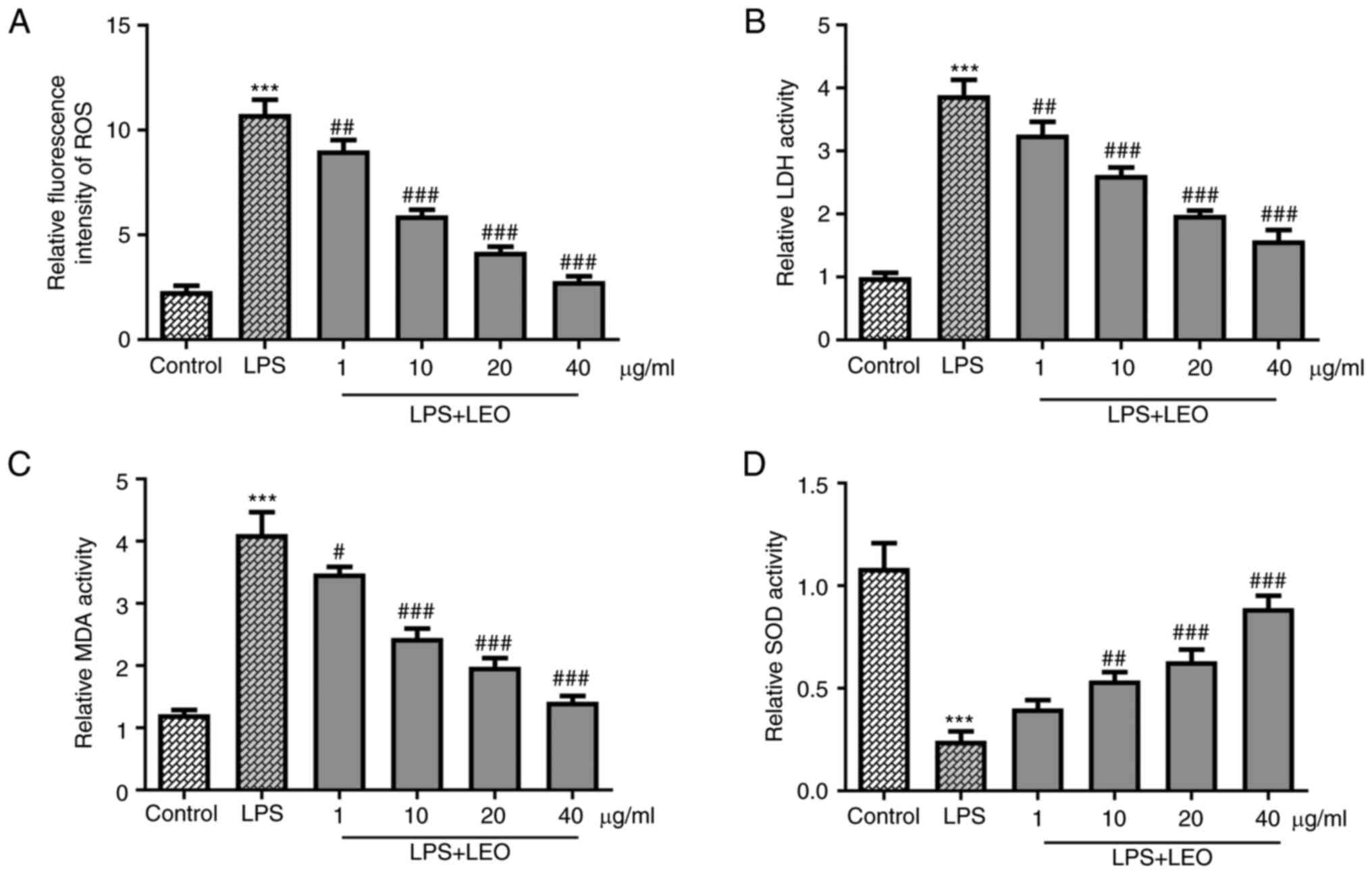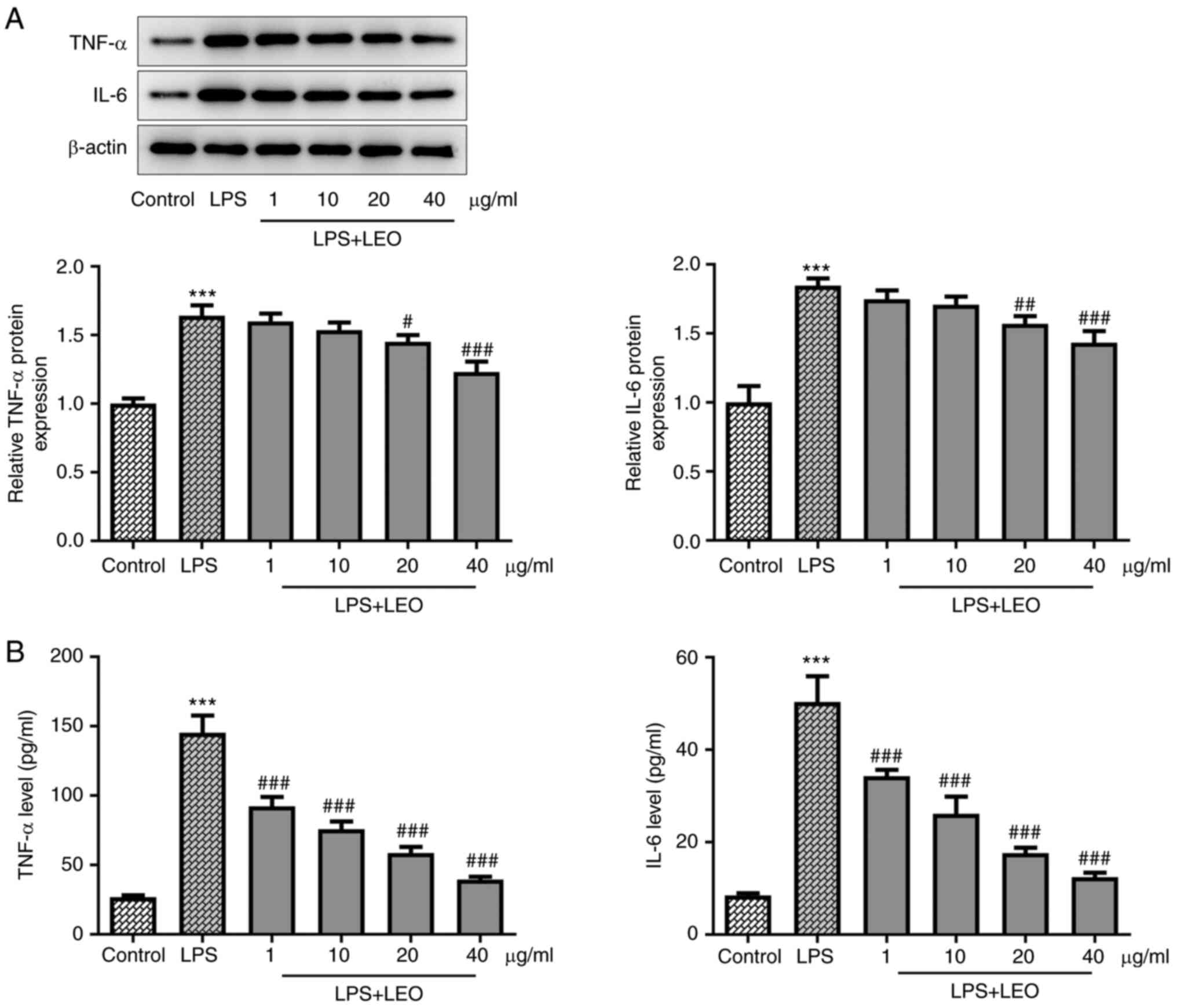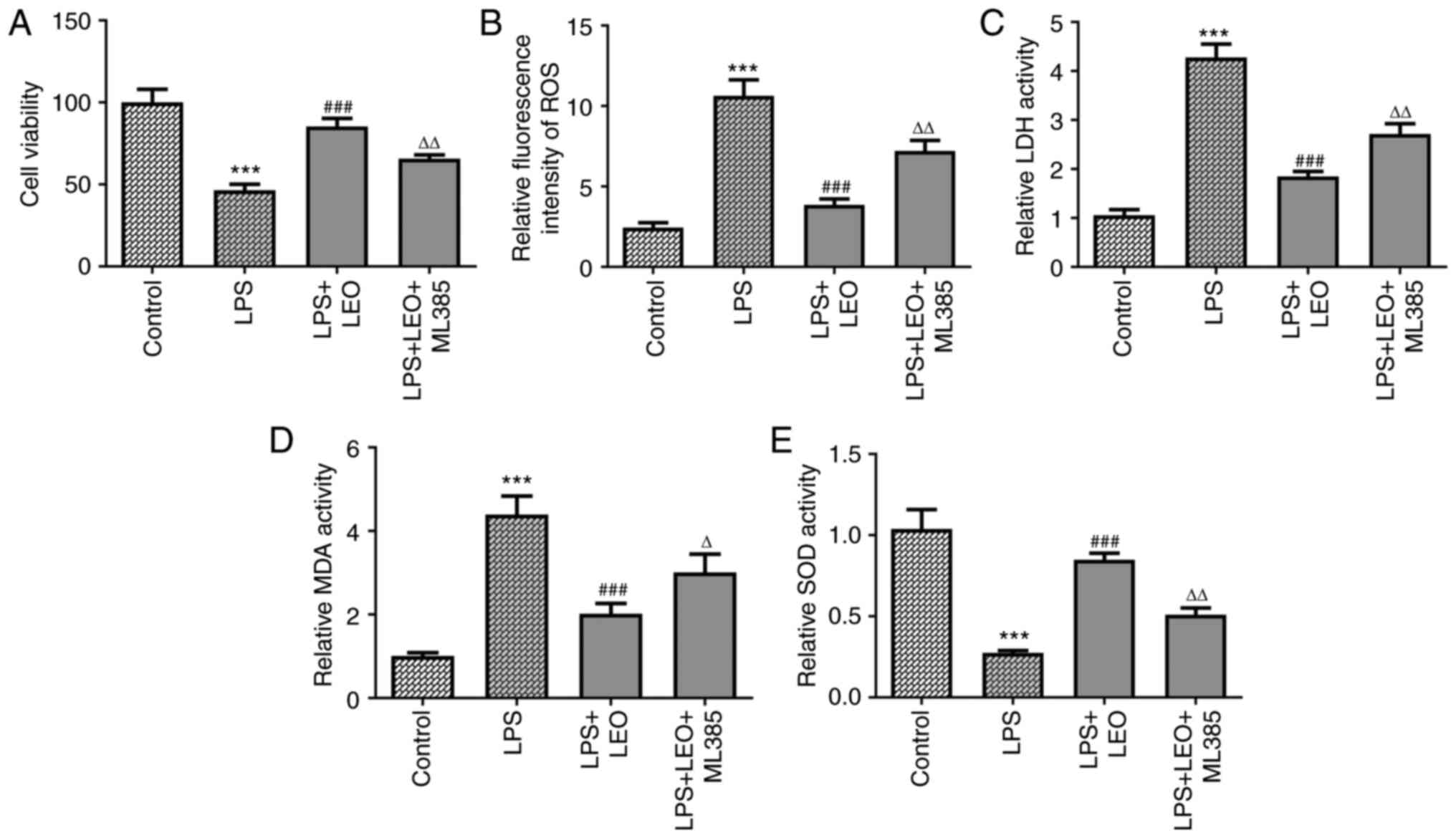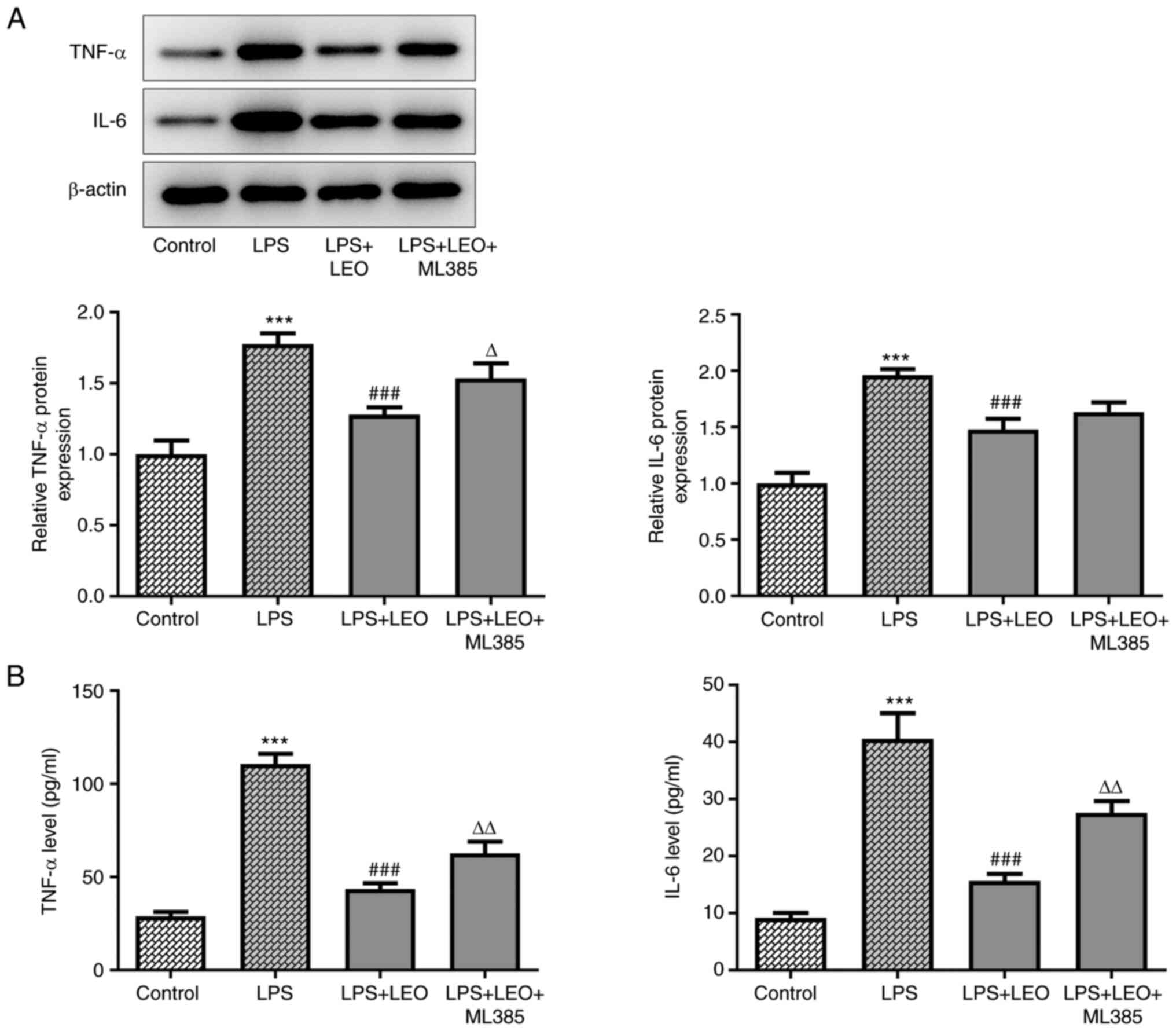|
1
|
Rudd KE, Johnson SC, Agesa KM, Shackelford
KA, Tsoi D, Kievlan DR, Colombara DV, Ikuta KS, Kissoon N, Finfer
S, et al: Global, regional, and national sepsis incidence and
mortality, 1990-2017: Analysis for the global burden of disease
study. Lancet. 395:200–211. 2020.PubMed/NCBI View Article : Google Scholar
|
|
2
|
Wang YM, Ji R, Chen WW, Huang SW, Zheng
YJ, Yang ZT, Qu HP, Chen H, Mao EQ, Chen Y and Chen EZ: Paclitaxel
alleviated sepsis-induced acute lung injury by activating MUC1 and
suppressing TLR-4/NF-κB pathway. Drug Des Devel Ther. 13:3391–3404.
2019.PubMed/NCBI View Article : Google Scholar
|
|
3
|
Zhang H, Wang W, Fang H, Yang Y, Li X, He
J, Jiang X, Wang W, Liu S, Hu J, et al: GSK-3β inhibition
attenuates CLP-induced liver injury by reducing inflammation and
hepatic cell apoptosis. Mediators Inflamm.
2014(629507)2014.PubMed/NCBI View Article : Google Scholar
|
|
4
|
Zhang Z, Han N and Shen Y: S100A12
promotes inflammation and cell apoptosis in sepsis-induced ARDS via
activation of NLRP3 inflammasome signaling. Mol Immunol. 122:38–48.
2020.PubMed/NCBI View Article : Google Scholar
|
|
5
|
Kim WY and Hong SB: Sepsis and acute
respiratory distress syndrome: Recent update. Tuberc Respir Dis
(Seoul). 79:53–57. 2016.PubMed/NCBI View Article : Google Scholar
|
|
6
|
Qiu N, Xu X and He Y: LncRNA TUG1
alleviates sepsis-induced acute lung injury by targeting
miR-34b-5p/GAB1. BMC Pulm Med. 20(49)2020.PubMed/NCBI View Article : Google Scholar
|
|
7
|
Fu H, Zhang J and Huang M: Topiroxostat
ameliorates oxidative stress and inflammation in sepsis-induced
lung injury. Z Naturforsch C J Biosci. 75:425–431. 2020.PubMed/NCBI View Article : Google Scholar
|
|
8
|
Hu Q, Wang Q, Han C and Yang Y: Sufentanil
attenuates inflammation and oxidative stress in sepsis-induced
acute lung injury by downregulating KNG1 expression. Mol Med Rep.
22:4298–4306. 2020.PubMed/NCBI View Article : Google Scholar
|
|
9
|
Xu W, Cui J, Zhou F, Bai M, Deng R and
Wang W: Leonurine protects against dexamethasone-induced
cytotoxicity in pancreatic β-cells via PI3K/Akt signaling pathway.
Biochem Biophys Res Commun. 529:652–658. 2020.PubMed/NCBI View Article : Google Scholar
|
|
10
|
Chen C, Zhu Z, Hu N, Liang X and Huang W:
Leonurine hydrochloride suppresses inflammatory responses and
ameliorates cartilage degradation in osteoarthritis via NF-κB
signaling pathway. Inflammation. 43:146–154. 2020.PubMed/NCBI View Article : Google Scholar
|
|
11
|
Ning K, Wang MJ, Lin G, Zhang YL, Li MY,
Yang BF, Chen Y, Huang Y, Li ZM, Huang YJ, et al: eNOS-nitric oxide
system contributes to a novel antiatherogenic effect of leonurine
via inflammation inhibition and plaque stabilization. J Pharmacol
Exp Ther. 373:463–475. 2020.PubMed/NCBI View Article : Google Scholar
|
|
12
|
Li YY, Lin YK, Liu XH, Wang L, Yu M, Li
DJ, Zhu YZ and Du MR: Leonurine: From gynecologic medicine to
pleiotropic agent. Chin J Integr Med. 26:152–160. 2020.PubMed/NCBI View Article : Google Scholar
|
|
13
|
Wang R, Li D, Ouyang J, Tian X, Zhao Y,
Peng X, Li S, Yu G and Yang J: Leonurine alleviates LPS-induced
myocarditis through suppressing the NF-кB signaling pathway.
Toxicology. 422:1–13. 2019.PubMed/NCBI View Article : Google Scholar
|
|
14
|
Xu D, Chen M, Ren X and Wu Y: Leonurine
ameliorates LPS-induced acute kidney injury via suppressing
ROS-mediated NF-κB signaling pathway. Fitoterapia. 97:148–155.
2014.PubMed/NCBI View Article : Google Scholar
|
|
15
|
Xu T, Li X, Leng T, Zhuang T, Sun Y, Tang
Y, Wang L, Yang M and Ji M: CYP2A13 acts as the main metabolic
CYP450s enzyme for activating leonurine in human bronchial
epithelial cells. Med Sci Monit. 26(e922149)2020.PubMed/NCBI View Article : Google Scholar
|
|
16
|
Chen P, Chen F and Zhou BH: Leonurine
ameliorates D-galactose-induced aging in mice through activation of
the Nrf2 signalling pathway. Aging (Albany NY). 11:7339–7356.
2019.PubMed/NCBI View Article : Google Scholar
|
|
17
|
Yuan CB, Tian L, Yang B and Zhou HY:
Isoalantolactone protects LPS-induced acute lung injury through
Nrf2 activation. Microb Pathog. 123:213–218. 2018.PubMed/NCBI View Article : Google Scholar
|
|
18
|
Kumar P, Nagarajan A and Uchil PD:
Analysis of cell viability by the MTT assay. Cold Spring Harb
Protoc. 2018:2018.PubMed/NCBI View Article : Google Scholar
|
|
19
|
Aziz M, Ode Y, Zhou M, Ochani M, Holodick
NE, Rothstein TL and Wang P: B-1a cells protect mice from
sepsis-induced acute lung injury. Mol Med. 24(26)2018.PubMed/NCBI View Article : Google Scholar
|
|
20
|
Mokra D and Kosutova P: Biomarkers in
acute lung injury. Respir Physiol Neurobiol. 209:52–58.
2015.PubMed/NCBI View Article : Google Scholar
|
|
21
|
Crystal RG, Randell SH, Engelhardt JF,
Voynow J and Sunday ME: Airway epithelial cells: Current concepts
and challenges. Proc Am Thorac Soc. 5:772–777. 2008.PubMed/NCBI View Article : Google Scholar
|
|
22
|
Lei J, Wei Y, Song P, Li Y, Zhang T, Feng
Q and Xu G: Cordycepin inhibits LPS-induced acute lung injury by
inhibiting inflammation and oxidative stress. Eur J Pharmacol.
818:110–114. 2018.PubMed/NCBI View Article : Google Scholar
|
|
23
|
Chen TH and Wang JJ: Niacin pretreatment
attenuates ischemia and reperfusion of pancreas-induced acute
pancreatitis and remote lung injury through suppressing oxidative
stress and inflammation and activation of SIRT1. Transplant Proc.
50:2860–2863. 2018.PubMed/NCBI View Article : Google Scholar
|
|
24
|
Wang X, An X, Wang X, Hu X, Bi J, Tong L,
Yang D, Song Y and Bai C: Peroxiredoxin 6 knockout aggravates cecal
ligation and puncture-induced acute lung injury. Int
Immunopharmacol. 68:252–258. 2019.PubMed/NCBI View Article : Google Scholar
|
|
25
|
Butt Y, Kurdowska A and Allen TC: Acute
lung injury: A clinical and molecular review. Arch Pathol Lab Med.
140:345–350. 2016.PubMed/NCBI View Article : Google Scholar
|
|
26
|
Matzinger M, Fischhuber K and Heiss EH:
Activation of Nrf2 signaling by natural products-can it alleviate
diabetes? Biotechnol Adv. 36:1738–1767. 2018.PubMed/NCBI View Article : Google Scholar
|
|
27
|
Pei X, Zhang XJ and Chen HM: Bardoxolone
treatment alleviates lipopolysaccharide (LPS)-induced acute lung
injury through suppressing inflammation and oxidative stress
regulated by Nrf2 signaling. Biochem Biophys Res Commun.
516:270–277. 2019.PubMed/NCBI View Article : Google Scholar
|















